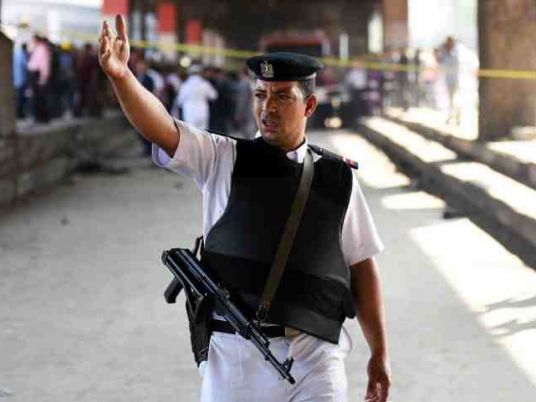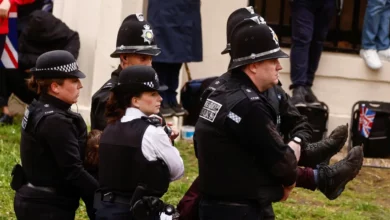The need for change in the police force is something even most police officers seem to agree on.
“A great deal of police officers are fed up, you will not believe how many handed in their resignation before the revolution… thousands,” says Major Mohamed Ahmed, a 10-year veteran of the force who intended to quit even before the revolution because of corruption and mismanagement.
At that time, many officers were too afraid of their bosses to send complaints or hand in resignations. But a post-revolutionary Egypt presents an opportunity to reform this once-feared institution.
During former Interior Minister Habib al-Adly’s reign, institutions under the ministry's umbrella, such as the police and State Security, became the most feared and despised government apparatuses. The 1.4 million-strong police force became the symbol and embodiment of a corrupt government that dehumanized citizens for its own gains.
People spoke of a rotten police corps in which extortion and torture were the norm. The desire to reform the institutions was so profound that it created the spark needed for the revolution. Many originally went out on 25 January, which also marked national Police Day, to protest police brutality and call for an overhaul of the Interior Ministry. But nearly three months later, it seems little has changed.
Now that al-Adly and other former officials have fallen from power, many police officers say they have their own demands for the reformation of the Interior Ministry. Some argue that there was a great deal of corruption among junior police officers because of the poor work conditions and environment established by their superiors.
Adel, a South Sinai policeman, said that low pay and poor conditions breed corruption among police. Officers in his situation are not given enough money for food and lodging, and they end up having to take food from passing vegetable carts and water from truck drivers, he said.
Policemen also complain of mistreatment within their precincts.
“How are we supposed to treat civilians with respect when we are humiliated every day by our commanding officers?” Adel said.
He blames the iniquities within the system on widespread extortion. Officers of the same rank tend to get paid differently based on their post. Those involved in economic security and securing private enterprises tend to get an official salary up to five times that of someone in the same rank working in public security.
But for Magda Adly, the director of the Nadeem Center for the Rehabilitation of Victims of Torture, those excuses don’t justify the abuse Egyptians have suffered at the hands of police for years.
“Many of them took it out on civilians, instead of enduring and taking it upon themselves to change the situation,” she said.
Some officers have recently proposed to do just that, forming The General Alliance of Police Officers, initially on Facebook, to create a progressive restructuring of the Interior Ministry. They hope to create a union-like structure that would allow for dialogue between the ranks and create a sense of accountability.
“If we resolve the problems within the police force, we can return to the streets in a much more positive way and start a new chapter with the people,” said Captain Ahmed Ragab, the group’s spokesperson and co-founder.
The group so far has 10,500 signatories from around the country, which Ragab considers a mandate, since he says the ministry has around 30,000 officers.
Ragab believes that one of the main obstacles to reform is the continued presence of remants of the corrupt former regime.
“We all support [new Interior Minister] Mansour al-Essawy and believe in his integrity,” said Ragab. “However, the layers of leadership under him were all symbols of corruption from al-Adly’s time. They might stymie efforts for reform.”
The association holds that overworking, under-compensation, nepotism, lack of training, and ill treatment are behind the corruption and ills of the ministry. They say that they would like to see everyone involved in ensuring that crimes, especially those committed during the revolution, are brought to trial.
But the longstanding problems within the police force run deep and require more than superficial reforms.
“The police force needs a complete overhaul. They need to be retrained and re-equipped mentally. You cannot have a police force that operates with a mentality formed over the past few years,” Adly, the anti-torture activist, said.
Many in the force themselves believe retraining is an integral part of reform.
“You would not believe the level of ignorance among officers who supposedly graduated from the academy,” said Ahmed, the major who has been serving in the police force for 10 years. He contends that around 60 percent of his peers are ignorant about basic legal matters and current affairs.
He said that during his time in the academy, many students passed in order to please a high-ranking relative of theirs.
“The police force during the time of Habib al-Adly did not like intellectual or learned policemen. They wanted drones that would just do as they are told,” said Hassan, an eight-year veteran of the South Sinai police force. Hassan believes the majority of police are not up to speed with current law or methods of interrogation and surveillance.
Although the police force sent officers to training sessions in Cairo, many didn’t go because they weren’t paid for attending.
“Whenever my precinct sent me to attend a training session in Cairo, they’d give me 75 piasters as my daily food allowance,” Hassan said.
On 28 January, during the height of the revolution, the police force evacuated from the streets in what many saw as a regime-sponsored attempt to foment chaos. Now they are supposed to be back, but most of those interviewed say they are not in full force.
Meanwhile, crime is reportedly on the rise across Egypt.
“We are back on the streets, but the truth is we’re just fulfilling our shifts and that’s all. There’s a general feeling that we lost our presence on the street,” said Ahmed.
Recently, the Interior Ministry has announced small reforms amounting to slight financial incentives and allowing for vacations, and some policemen and civilians have told of better treatment by officers at the stations. But like most institutional reforms, it is a slow process, and many more significant changes are needed to win the public's confidence in its police force.




